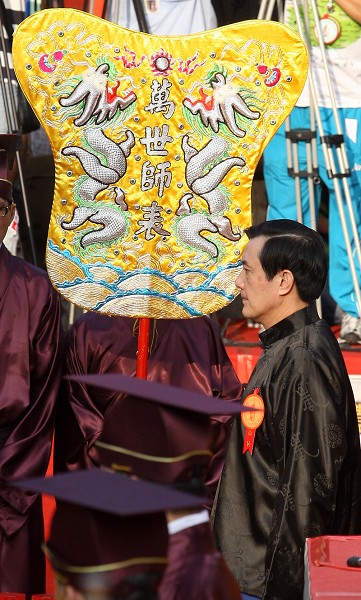Ma gave an interview yesterday morning to Taiwan's China Television (CTV, 中視) which covered quite a lot of ground and touched on everything from peace talks with Beijing to the Assembly and Parade Law to the WHO and Beijing's MOU with them.
I'm going to start with the peace talks article, which was the lead today in the Taipei Times. Let's get right to the text:
President Ma Ying-jeou (馬英九) yesterday said he would not negotiate unification with China during his presidency, but would consider launching talks on a peace agreement if re-elected in 2012....
This is clearly a retreat off of earlier Ma statements about wanting to have a peace agreement signed during his first term. That could mean either Beijing and Taipei plan to break up the agreement into two parts, one less controversial and one more, and sign those before the election (to give Ma a boost) and the second one after. Or, perhaps Beijing or Taipei simply fear backlash if such steps are taken within such a short four year period. It could also mean that the gaps between Beijing and Taipei on the key sovereignty question is simply too big to imagine the agreement being signed in the first four years.
... He said that he had promised in his inauguration address, under the framework of the Republic of China Constitution [A-gu: emphasis mine], not to discuss unification with Beijing during his presidency, not to pursue or support de jure independence and not to use military force to resolve the matter of Taiwan’s status.
“I will not engage in talks on unification with mainland China during my presidency, regardless of whether it lasts four years or eight,” he said.
Does this imply that according to Ma's reading of the ROC Constitution, he can no more discuss the prospect of unification than he can try to declare independence? I hate to say it, but that would be a very useful wedge indeed that would help keep Beijing at bay. In fact, such a reading could serve as a basis for internal political consensus on cross-strait relations (as if either party would want that).
Also note that Ma does assures voters that they can vote for him twice without fear of bieng fully sold out.
Nor would political negotiations necessarily have to start in 2012, he said, adding that it would depend on developments and whether more pressing issues such as the economy had been addressed.
This statement seems to just be a way of denying a 'unification time table,' a charge that was thrown at Ma right after the interviews Friday with Singapore media.
Ma said he was aware of China’s efforts to achieve unification, but that his administration was focusing on more urgent, less controversial matters, including the economy.
Although these negotiations inevitably touch on some political matters, both sides have sought to avoid sensitive topics, he said.
Ma said the political agenda behind Beijing’s economic engagement with Taiwan was no secret, yet “some administrations handle it well, some not so well.”
“I think my administration handles it rather well,” he said, adding that Beijing does not seek political gains in all its dealings with Taiwan and that a win-win situation for both sides of the Strait is possible.
Besides the swipe at the Chen administration, Ma also reinforces that he really does see the economic and political issues as separate ones, and to be honest I hope he's right (but doubt it). He also may be implying that even though the CCP sees the economic and political issues as going hand in hand, the Ma administration is just not going to let them use one to leverage the other. Again, sounds great, but awfully difficult to put into practice.
Ma said Beijing was hesitant to sign an economic cooperation framework agreement (ECFA), possibly because of differences between Taiwan’s ruling and opposition parties. However, Chinese President Hu Jintao (胡錦濤) and Premier Wen Jiabao (溫家寶) have both expressed interest in an ECFA....
Beijing might also be hesitant to sign because they are holding out for further KMT concessions.
...Ma said the economic pact would likely be one topic at the next round of cross-strait talks, scheduled for the second half of the year.
The president said he did not have any immediate plans to visit China, adding that high-level visits were complicated by issues of security and national sovereignty and dignity.
“My approach has always been to deal with a problem if we cannot solve it,” he said. “You’ll achieve nothing by fixating on sovereignty. Cross-strait relations have developed since we came to power because both sides set aside their differences and focused on more pressing and solvable matters.” [A-gu: emphasis mine]
In principle I could agree, except
I don't see China setting aside the sovereignty issue (despite CCP propaganda events meant to
imply otherwise). That doesn't seem like truly setting aside differences. It seems to me that it's more like the KMT just closing its eyes to Beijing's oft-repeated position.
Further, the KMT for its part is fixating on sovereignty, not in its daily rhetoric but in its claim to own an ROC that includes all of mainland China. It was the DPP that proposed begininng negotiations without any "One China" or even "One China, One Taiwan" preconditions, and Beijing that refused that point.
In response, DPP spokesman Cheng Wen-tsang (鄭文燦) said Ma should not lie to the public about unification with China.
Cheng said the DPP viewed Ma’s policies as geared at achieving unification. Ma’s strategy for dealing with criticism is to lie to the public, Cheng said.
The DPP urged Ma to put an end to policies that move toward unification.
Here's a classic case of the DPP speaking with such a lack of refinement or substance that even if their ultimate conclusion is correct, nobody will listen to them.



